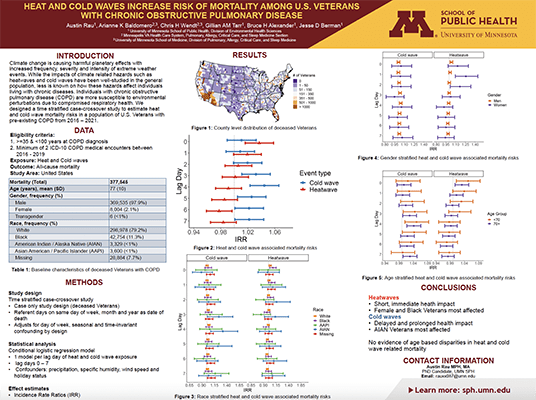Austin Rau
PhD, Environmental Health
Co-Authors:
Arianne K Baldomero, Chris H Wendt, Gillian AM Tarr, Bruce H Alexander, Jesse D Berman
Advisor:
Jesse Berman
Keywords:
COPD, climate change
Abstract
Chronic obstructive pulmonary disease (COPD) is a heterogeneous pulmonary disease affecting 16 million Americans. Environmental disturbances including heatwaves and cold waves can exacerbate disease symptoms which is of concern since these extreme weather events may become more frequent and intense under climate change. We collected individual level data from the Veteran’s Health Administration (2016 – 2021) on a cohort of 377,545 deceased U.S. Veterans diagnosed with COPD to estimate heat and cold wave associated mortality risks. We designed a time stratified case crossover study and estimated the incidence rate ratios (IRR) of heat and cold wave mortality risks among our population using conditional logistic regression models. Lagged effects up to 7 days were examined. Effect modification by age, sex and race were also explored. Heatwaves had the strongest effect on mortality at lag day 0 (IRR: 1.04 [1.02, 1.06]) and effects attenuated by lag day 3. The effect of cold waves on mortality steadily increased over time and plateaued at lag day 4 (IRR: 1.04 [1.02, 1.06]) with declining observed effects, however, impacts of cold waves persisted over the entire 7-day lag period. Veterans of advanced age and females had large mortality risks associated with cold waves and heatwaves respectively. Our study demonstrated harmful associations of heat and cold waves among a vulnerable population with pre-existing COPD using individual level health and location data. Future research should emphasize the usage of individual level health and location data to better estimate associations between extreme weather events and health outcomes.

View Poster (PDF)
